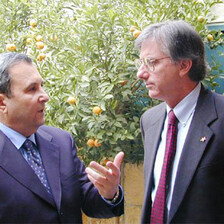The Electronic Intifada 11 August 2008
US Secretary of State Condoleezza Rice recently convened Palestinian and Israeli negotiators in Washington. Under a rumored deal, Israeli leaders will agree to keep only part of land that doesn’t belong to them while Palestinian leaders agree to give up rights not theirs to cede.
Borders in exchange for the Palestinian refugees’ right of return, with the issue of Jerusalem left hanging for now, is where negotiations supposedly stand. Rice’s peacemaking ambitions are said to have boiled down to presenting a reasonable report to the UN General Assembly and the next president.
If Israeli leaders agree to withdraw their soldiers and settlers from parts of the West Bank (in fact, they’ve just announced plans for a new settlement), and if Palestinian leaders can sell their people an exchange of rights for a chimera (in fact, they’re likely to face fierce resistance), and if anyone who’s followed this process believes in such a deal, then Rice will certainly succeed.
So many “ifs,” so little time. A more fruitful avenue for speculation: What if Barack Obama is elected president and follows through on his campaign promise to immediately engage on the Arab-Israeli conflict? Can he succeed where Rice has failed? (President George W. Bush is too invisible to even mention).
Whether a President Obama can succeed depends on getting three things right: the reality on the ground, the team, and political will. Reality is not easy to get in office. Just ask Tony Blair, the former British prime minister now Middle East envoy for the Quartet (the US, Russia, the European Union, and the United Nations).
When Blair took on this job, he reportedly saw a presentation by the UN office that coordinates humanitarian affairs in the occupied Palestinian territories. This short, stark visual superimposes each piece of Israel’s illegal occupation infrastructure over a map of the West Bank — some 150 settlements, 500,000 settlers, 100 outposts, closed military areas, 27 military bases, nature reserves, the wall, settler-only roads, checkpoints, and tunnels. By the final overlay, “Palestine” looks like slivers of flesh hanging off a skeleton. After the presentation, Blair is said to have turned to an aide and asked, “Why didn’t I know this?”
Why, indeed?
There’s no lack of information about what’s happening to Palestinian land and lives. If Obama becomes president, he should take 10 minutes to check out the UN’s “The Fragmentation of the West Bank” at ochaopt.org. It is why a growing number of Palestinians now question the viability of a two state-solution and call for equal rights in Israel-Palestine.
Second question: Who would Obama put to work on the Middle East?
Step forward Dennis Ross, the American who did least to stop the fragmentation of the West Bank. He is apparently such a close advisor that he traveled ahead to prepare for Obama’s trip to Israel. If Ross is appointed in the next administration, kiss a fair settlement goodbye. For years, Ross was the Clinton Administration’s lead negotiator on the Middle East, watching the number of settlers double in the West Bank as Israel’s colonization project continued unchecked. And before that he served in the administration of George H. W. Bush.
At a recent forum in an august Washington establishment, I had the opportunity to quiz Ross on his record. The settlements, I noted, are not a detail you put on scales weighing the performance of “both sides.” Rather, they are pulling the very land out from under Palestinian feet and any prospective state. Ross acknowledged that the United States should have taken a stronger stand on the settlements; that it had not was, in hindsight, a “mistake.” Big mistake.
Many Palestinians question Ross’ good faith. They note that he is closely associated to the Washington Institute for Near East Policy, the think tank closest to AIPAC, the lobby most responsible for pushing support for Israel’s hard line in Congress and the Administration. And he’s just become chairman of a new policy institute set up by the Jewish Agency.
According to a compelling analysis by Norman Finkelstein — not a fan — Ross reduced internationally accepted Palestinian rights to the status of needs, and then proceeded to demand equal consideration of Palestinian and Israeli needs in the occupied West Bank (see Dennis Ross and the Peace Process, Institute for Palestine Studies).
Ross is no neutral broker. He argued in a recent talk to Foreign Policy Professionals for Obama, that solving the Palestinian-Israeli conflict doesn’t so much need an honest broker as an effective one. But effective to what end?
Any administration that is really serious about resolving this conflict, should only approach Ross with a bargepole.
Third question: political will. Would a president Obama have what it takes for a settlement both sides can live with? A young American recently asked me if Obama might recover his erstwhile sympathy for the Palestinians once in office and whether she should vote for him.
Whichever way she chooses to vote, the reality is that the political will for a just and lasting peace is not something to be left to the politicians of any party. It needs to be demanded by Americans who care for Palestine and Israel. And, if it is, then the next president of the US will act accordingly.
Nadia Hijab is Senior Fellow at the Institute for Palestine Studies. This essay is an amended version of an op-ed syndicated by Agence Global on 30 July 2008.




